San Pedro Sula Prison, Cortes, Honduras September 1995
This assignment was commissioned by Arie Hoekman from the United Nations Population Fund (UNFPA) to provide photographic documentation of the chronic overcrowding and crumbling infrastructure of the prison. The photographs were to be used to illustrate reports written by the UNFPA to inform and generate additional funding to help improve the desperate conditions at the prison, deliver better medical facilities and education programs.
Built in 1950 the prison was originally intended to accommodate 800 prisoners, however by 1995 the prison housed more than 2000 male and female inmates. The prison is termed as a ‘self governing prison’, which means the inmates effectively control the prison. The prison guards only control the entry and exit gates and patrol the perimeter walls, their job is simply the stop prisoners escaping and are not concerned with what happens inside the prison.
In order to gain access to the prison I had not only to get permission from the prison authorities but also from the prisoners themselves. The prisoners who liaise with the prison authorities and control the inmates are known as ‘coordinators’. Coordinators are provided with wooden batons by the prison authorities, have their own keys, supervise the distribution of food and enforce discipline.
Both the prison authorities and coordinators were happy for me to photograph at the prison as any improvement to the degrading conditions, overcrowding, inadequate nutrition and poor sanitation would be welcomed.
This work was facilitated by the United Nations Population Fund (UNFPA) and supported by The World Health Organisation and Panos Pictures.

[P 01] Visitors at the gatehouse wait to enter the prison.

[P 02] Perimeter guard armed with a machete.

[P 03] The exercise yard, it’s also known as the ‘patio’.

[P 04] These lines in the exercise yard are for drying clothes, there are large concrete sinks around the perimeter for washing clothes.

[P 05] Gambling in the exercise yard.
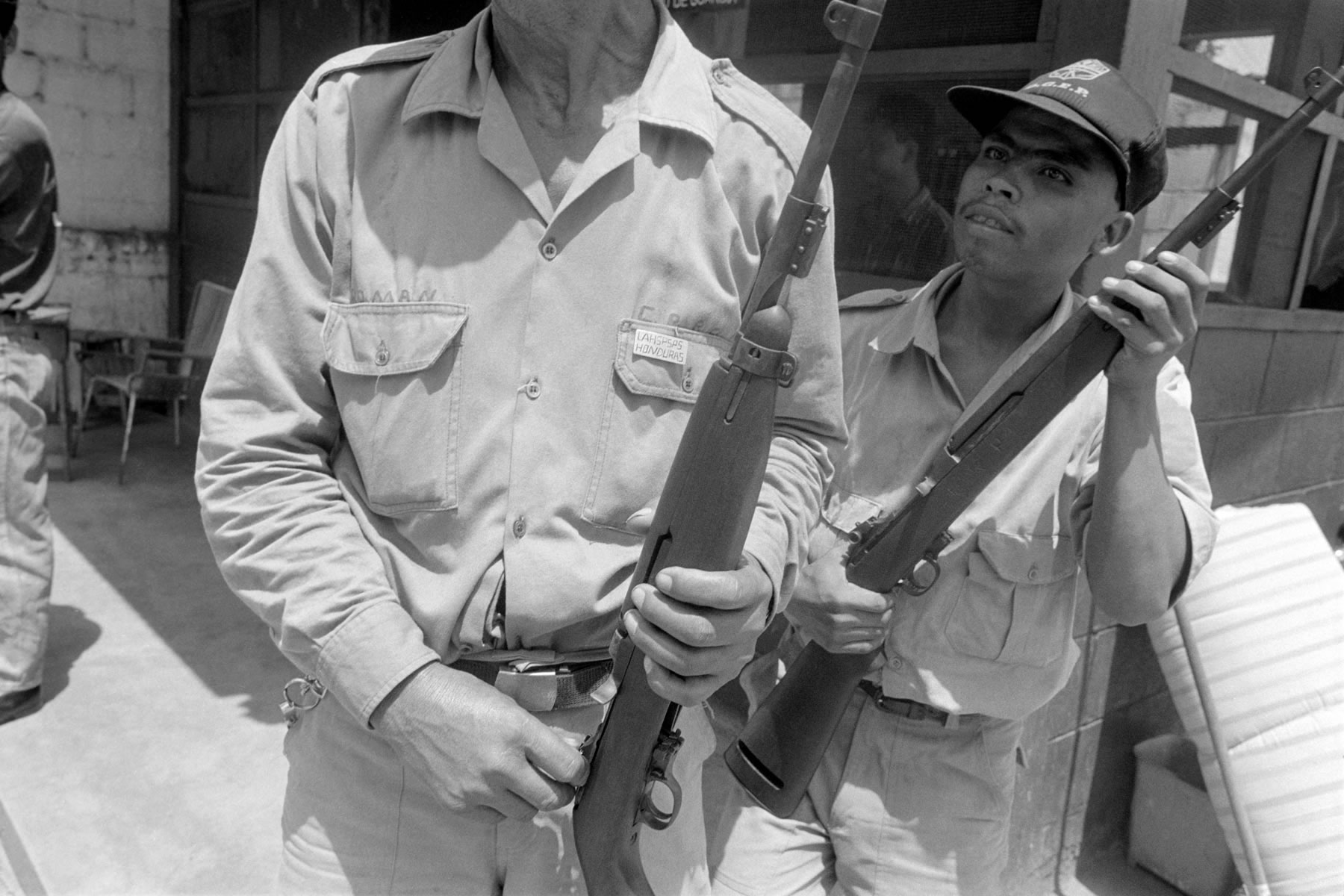
[P 06] Prison guards unload their rifles as they change shifts. They are armed with rifles, hand guns, batons and machetes. They need permission to enter certain areas of the prison that are controlled by coordinators.

[P 07] Senior prison guard shows off his rings.

[P 08] Senior prison guard and prisoner. He is telling me how well the prisoners are looked after.

[P 09] The prisoner (left) has been segregated for disruptive behaviour.

[P 10] Inside the perimeter wall these two men are among the some of the most confrontational and violent prisoners in the prison. The man on the right is making threatening hand gestures towards us indicating his affiliation to the MS-13 gang. Mara Salvatruncha, known as MS-13, is a criminal organisation originating from Los Angeles, known for its extreme violence.

[P 11] Prisoners preparing rice in the prison kitchen. All the cooking is done on an open fire. Working in the kitchen is a sought after job, usually requiring good connections with the coordinators and prison authorities.

[P 12] To the amusement of the coordinator escorting us, he said these two prisoners who work in the kitchen, were both convicted of murdering their wives.

[P 13] Prisoner enveloped by smoke from the kitchen fire.

[P 14] Hundreds of cooked tortillas from the kitchen are ready to be served.

[P 15] A coordinator holds back prisoners with his baton as they queue for food. The man kneeling has passed his bowl through a hole in the wall into the kitchen where prepared food will be served into it. Meals are served twice a day, meat is provided once a week.

[P 16] A prisoner passes his plastic bowl through a hole in the wall into the kitchen serving area where food will be served into it.

[P 17] Prisoner receives his meal of rice, frijoles molidos (mashed and fried beans) and tortillas from the hole in the wall.
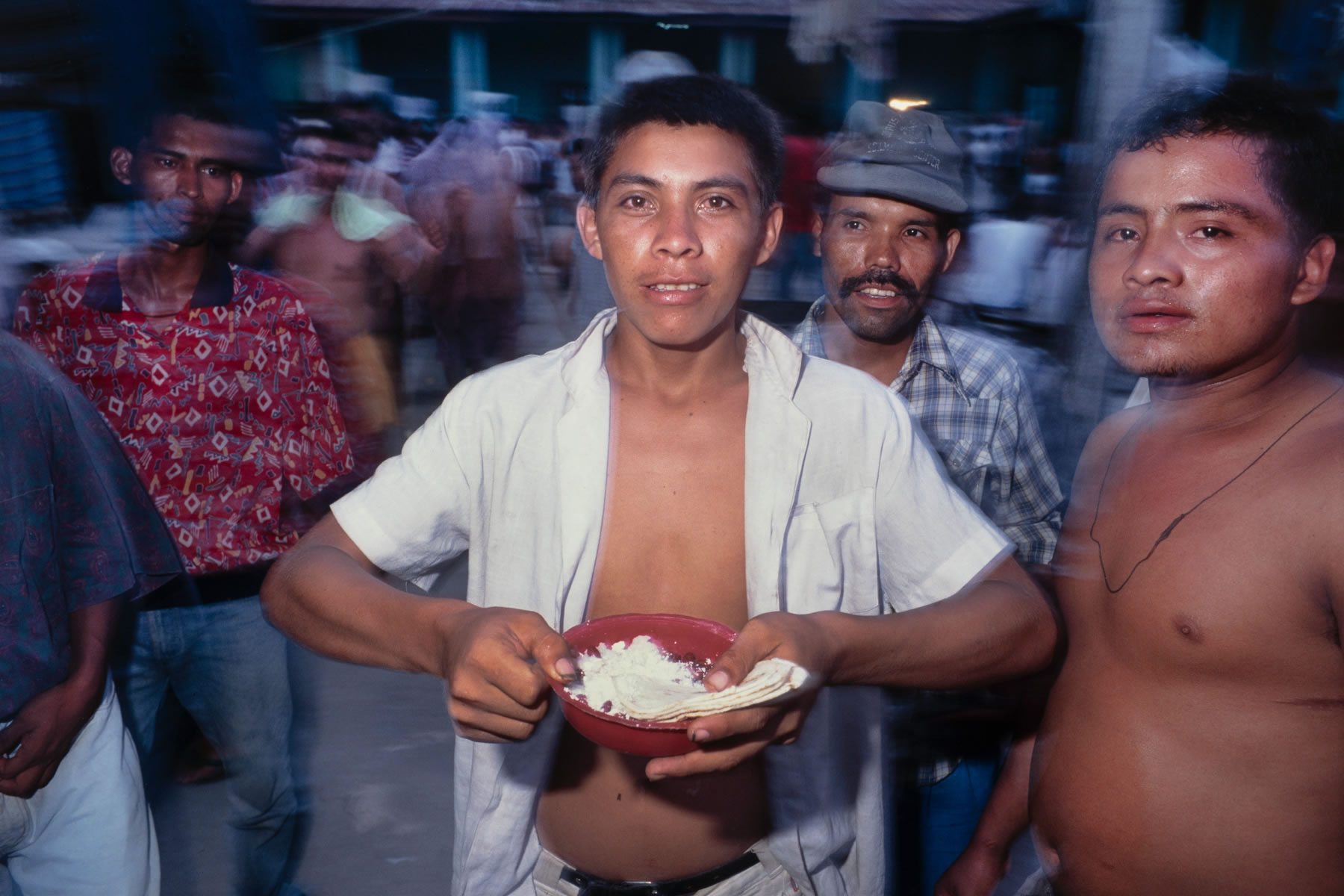
[P 18] Prisoner eats his evening meal in the exercise yard.

[P 19] Female prisoner eats her meal. She is eating frijoles molidos, rice and tortillas.

[P 20] Mother and child in their cell.
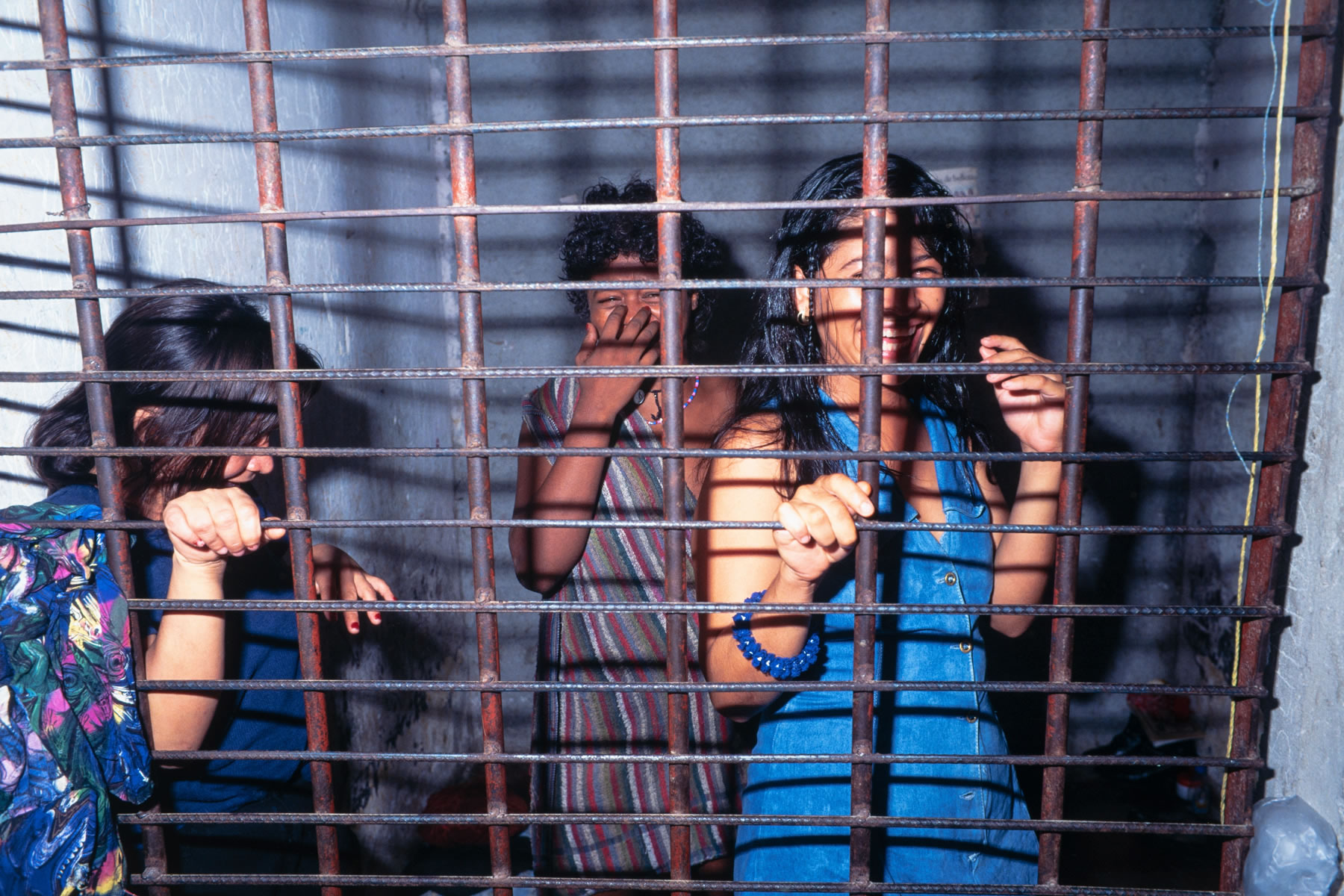
[P 21] Women prisoners become embarrassed having their photograph taken.

[P 22] Prisoners in the exercise yard at night.

[P 23] This prisoner climbs up a fence and says he is innocent of the charges made against him and asks if I can help him.

[P 24] Privileged inmates playing pool at night. The room is illuminated by a single lightbulb.

[P 25] Playing pool at night.
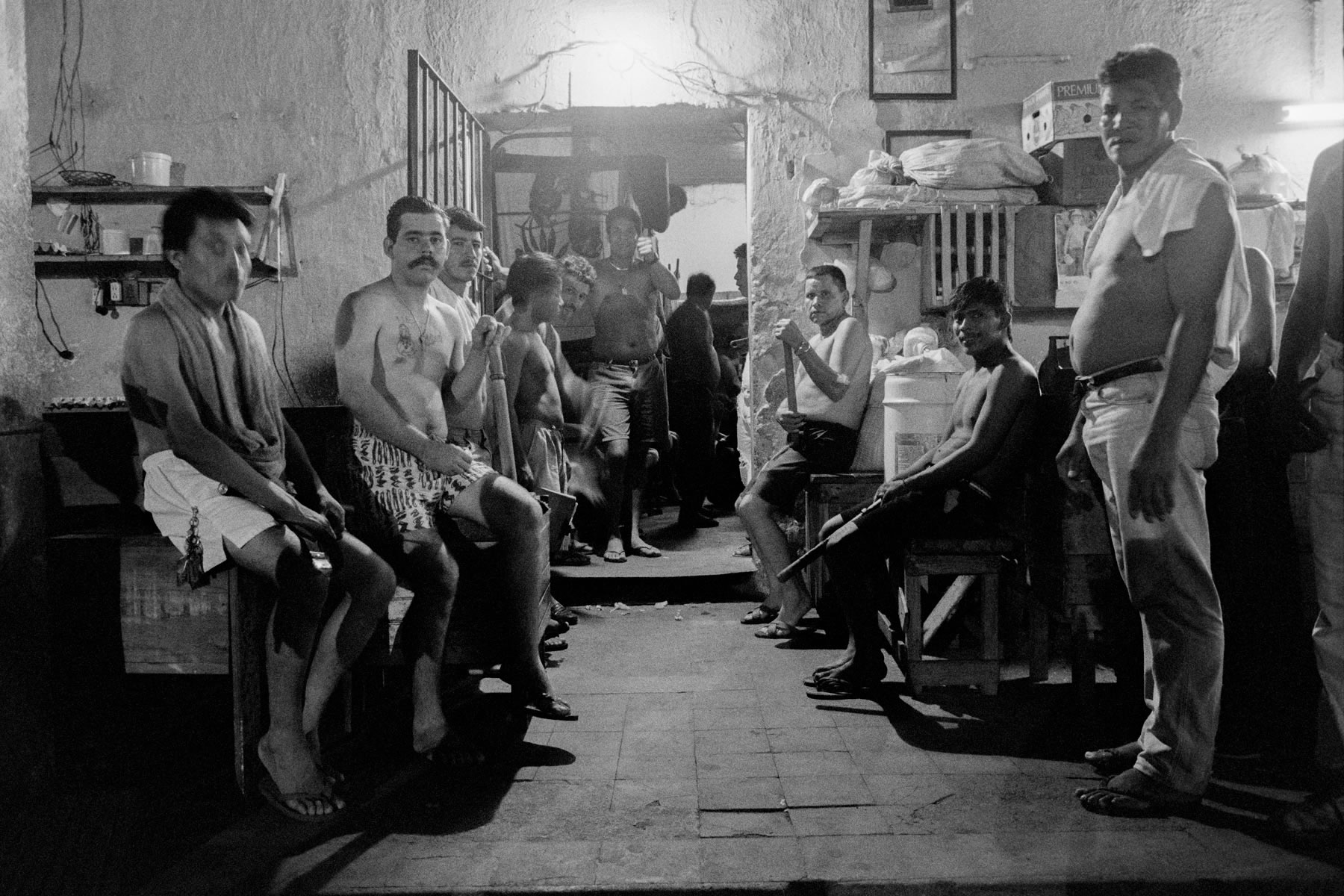
[P 26] Coordinators each carrying their batons socialise and discuss issues relating to running the prison each evening.

[P 27] One of the hot, humid, airless and severely overcrowded mens dormitories. #1

[P 28] #2

[P 29] #3

[P 28] #4

[P 31] With no bunks or mattresses available, prisoners sleep on the overcrowded dormitory floor.
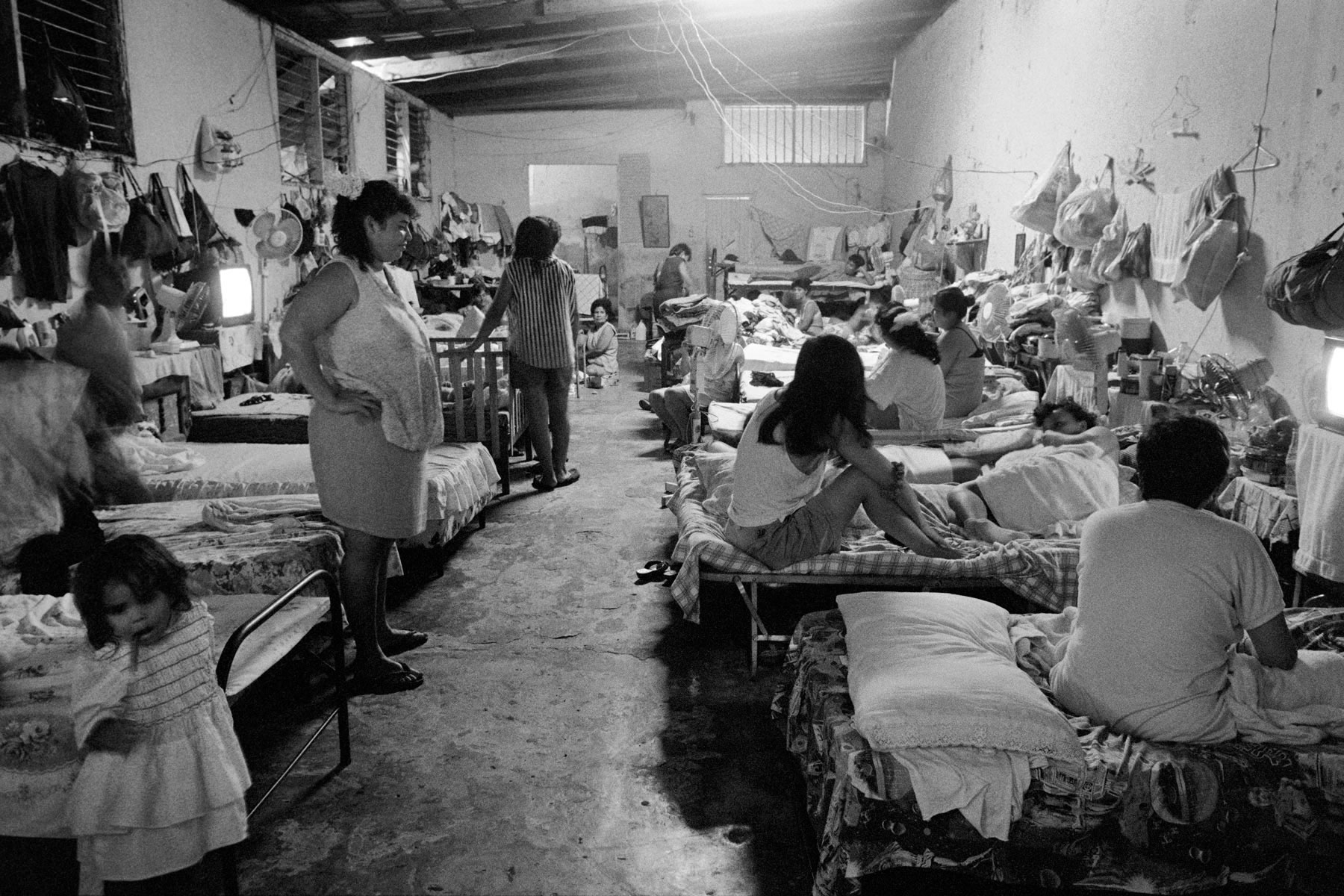
[P 32] Women and children prepare for bed in their dormitory.

[P 33] The washing and toilet facilities are located in a stinking, airless, lightless room. This man has water poured over him by a subordinate prisoner.

[P 34] Woman visits her husband in the prison hospital. He is dying from AIDS related TB.

[P 35] Wealthy prisoners can pay for their own private cells from the prison authorities. These prisoners are often convicted corrupt government officials or mid ranking drug dealers. This prisoner has decorated his cell to his own taste, has a colour TV, music player and fridge. He pays for his own food which is prepared for him outside the prison. He can also receive overnight visits from his wife, girlfriend or sex workers.

[P 36] Small businesses such as tailoring are permitted to be run by prisoners, they can also sell food, sweets, drinks and clothing to the prisoners and visitors.

[P 37] Prisoner poses by a chain link wire fence.

[P 01] Visitors at the gatehouse wait to enter the prison.

[P 02] Perimeter guard armed with a machete.

[P 03] The exercise yard, it’s also known as the ‘patio’.

[P 04] These lines in the exercise yard are for drying clothes, there are large concrete sinks around the perimeter for washing clothes.

[P 05] Gambling in the exercise yard.

[P 06] Prison guards unload their rifles as they change shifts. They are armed with rifles, hand guns, batons and machetes. They need permission to enter certain areas of the prison that are controlled by coordinators.

[P 07] Senior prison guard shows off his rings.

[P 08] Senior prison guard and prisoner. He is telling me how well the prisoners are looked after.

[P 09] The prisoner (left) has been segregated for disruptive behaviour.

[P 10] Inside the perimeter wall these two men are among the some of the most confrontational and violent prisoners in the prison. The man on the right is making threatening hand gestures towards us indicating his affiliation to the MS-13 gang. Mara Salvatruncha, known as MS-13, is a criminal organisation originating from Los Angeles, known for its extreme violence.

[P 11] Prisoners preparing rice in the prison kitchen. All the cooking is done on an open fire. Working in the kitchen is a sought after job, usually requiring good connections with the coordinators and prison authorities.

[P 12] To the amusement of the coordinator escorting us, he said these two prisoners who work in the kitchen, were both convicted of murdering their wives.

[P 13] Prisoner enveloped by smoke from the kitchen fire.

[P 14] Hundreds of cooked tortillas from the kitchen are ready to be served.

[P 15] A coordinator holds back prisoners with his baton as they queue for food. The man kneeling has passed his bowl through a hole in the wall into the kitchen where prepared food will be served into it. Meals are served twice a day, meat is provided once a week.

[P 16] A prisoner passes his plastic bowl through a hole in the wall into the kitchen serving area where food will be served into it.

[P 17] Prisoner receives his meal of rice, frijoles molidos (mashed and fried beans) and tortillas from the hole in the wall.

[P 18] Prisoner eats his evening meal in the exercise yard.

[P 19] Female prisoner eats her meal. She is eating frijoles molidos, rice and tortillas.

[P 20] Mother and child in their cell.

[P 21] Women prisoners become embarrassed having their photograph taken.

[P 22] Prisoners in the exercise yard at night.

[P 23] This prisoner climbs up a fence and says he is innocent of the charges made against him and asks if I can help him.

[P 24] Privileged inmates playing pool at night. The room is illuminated by a single lightbulb.

[P 25] Playing pool at night.

[P 26] Coordinators each carrying their batons socialise and discuss issues relating to running the prison each evening.

[P 27] One of the hot, humid, airless and severely overcrowded mens dormitories. #1

[P 28] #2

[P 29] #3

[P 28] #4

[P 31] With no bunks or mattresses available, prisoners sleep on the overcrowded dormitory floor.

[P 32] Women and children prepare for bed in their dormitory.

[P 33] The washing and toilet facilities are located in a stinking, airless, lightless room. This man has water poured over him by a subordinate prisoner.

[P 34] Woman visits her husband in the prison hospital. He is dying from AIDS related TB.

[P 35] Wealthy prisoners can pay for their own private cells from the prison authorities. These prisoners are often convicted corrupt government officials or mid ranking drug dealers. This prisoner has decorated his cell to his own taste, has a colour TV, music player and fridge. He pays for his own food which is prepared for him outside the prison. He can also receive overnight visits from his wife, girlfriend or sex workers.

[P 36] Small businesses such as tailoring are permitted to be run by prisoners, they can also sell food, sweets, drinks and clothing to the prisoners and visitors.

[P 37] Prisoner poses by a chain link wire fence.
Postscipt
My final visit to San Pedro Sula (SPS) was in September 1995, to photography maquiladora workers and the conditions at SPS prison, however it was becoming clear that law and order was completely breaking down in the city as organised crime gangs fought to dominate the drugs trade. It was possible to murder with impunity in SPS as the police, local government officials and security forces at this time were ineffective and mostly corrupt.
A turning point occurred when I witnessed the murder of a man gunned down on a busy street in the barrio Cabañas. Perhaps the most shocking part was that after the murderer fired all six bullets into the man from a small revolver through his open truck window, he then drove deliberately slowly though the crowded street, wishing to be identified to all onlookers that he was the murderer and was untouchable. He stopped and looked at me, reloaded his gun then thankfully drove on. When I returned to my hotel later, I received a threatening phone call which I only partly understood. Within an hour of witnessing the murder I had been traced back to my hotel.
The following day I caught a bus to Morazán and waited there until I could arrange a flight to the US. It was clearly not safe for me to continue to work in the city that I had become so enthralled with, regretfully I left and have never returned.
I later found out that the murderer was a ‘hitman’ or ‘Sicarios’ who worked for a drug trafficker and the man he had shot had attempted to steal from them. The thief had already been beaten and was waiting for his death sentence to be carried out. The murderer was obligated to ‘execute’ the man in public in order to show they were not a ‘soft touch’, sending out a warning to other potential thieves that ‘summary justice’ would be carried out if anyone tried to rob them again.
With no effective police force in SPS, reporting this crime to them would be pointless and extremely dangerous particularly as the drug traffickers hold more power than the police. Despite numerous witnesses to this murder including myself no-one dared report it to the police.
In 2013 San Pedro Sula had been confirmed as the city with the highest murder rate in the world.
All images are Strictly Copyright © Bill Stephenson. All Rights Reserved.
